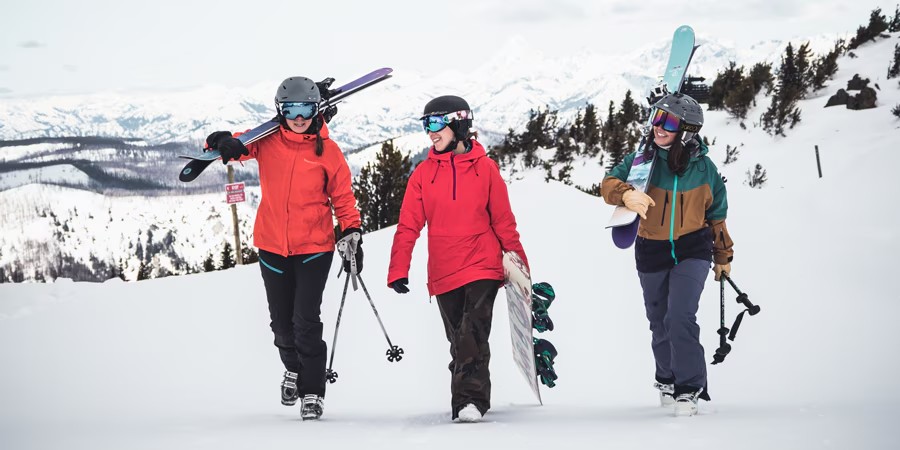Embarking on your first ski trip and staying at luxury catered chalet tignes is an exhilarating experience filled with anticipation and adventure. However, it can also be a bit daunting if you’re not sure what to expect or how to prepare. This guide will help you navigate the essentials, from planning and packing to hitting the slopes with confidence.
What to Expect
- The Learning Curve
Skiing for the first time can be challenging. Expect to spend some time on the beginner slopes (often called the “bunny slopes”) as you get the hang of the basics. It’s normal to fall a few times, so don’t get discouraged. The more you practise, the better you’ll become.
- Physical Demands
Skiing is a physically demanding sport that requires strength, balance, and endurance. Be prepared for a full-body workout, especially in your legs and core. It’s common to feel muscle fatigue after your first day.
- Weather Conditions
Mountain weather can be unpredictable. Conditions can change rapidly from sunny and warm to cold and snowy. Dressing in layers is key to staying comfortable throughout the day.
- Equipment Rental
If you don’t own ski equipment, you’ll need to rent it. This includes skis, poles, boots, and a helmet. Most ski resorts have rental shops that will fit you with the right gear. It’s a good idea to arrive early to avoid long lines and ensure you have plenty of time to get fitted.
How to Prepare
- Book a Lesson
Taking a lesson from a professional ski instructor is one of the best ways to start. Instructors can teach you proper techniques, safety rules, and help you build confidence. Many resorts offer group and private lessons for all skill levels.
- Dress Appropriately
Wearing the right clothing can make or break your ski experience. Here’s what you’ll need:
- Base Layers: Moisture-wicking thermal tops and bottoms.
- Mid Layers: Fleece or insulated jackets for warmth.
- Outer Layers: Waterproof and windproof ski jacket and pants.
- Accessories: Waterproof gloves or mittens, a neck gaiter or scarf, and a warm hat or helmet liner.
- Socks: High-quality ski socks (avoid cotton).
- Protect Your Eyes and Skin
The sun’s reflection off the snow can be intense, even on cloudy days. Wear UV-protective ski goggles and apply sunscreen with a high SPF to all exposed skin, including your face and lips.
- Stay Hydrated and Energised
Skiing is strenuous, so it’s important to stay hydrated and keep your energy levels up. Bring a water bottle and some high-energy snacks like nuts, granola bars, or fruit to munch on throughout the day.
- Get in Shape
Improving your fitness before your trip can make your skiing experience more enjoyable. Focus on exercises that build leg strength, balance, and cardiovascular endurance. Squats, lunges, and core exercises are particularly beneficial.
- Familiarise Yourself with the Resort
Before you go, take some time to learn about the resort. Look at trail maps, read reviews, and check out what amenities and services are available. Knowing the layout can help you feel more comfortable and make it easier to navigate once you arrive.
- Understand Basic Skiing Etiquette
Knowing the basic rules of the slopes is crucial for your safety and the safety of others:
- Always look uphill and yield to others when merging onto a trail.
- Respect signs and ski within your ability.
- Stop in visible locations and avoid obstructing trails.
- Be mindful of other skiers and snowboarders around you.
On the Slopes
- Start Slow
Begin with the easiest slopes to get a feel for the snow and your equipment. Practice stopping, turning, and controlling your speed. As you gain confidence, gradually move on to more challenging runs.
- Use Chairlifts Safely
Chairlifts can be intimidating for beginners. Pay attention to the lift operator’s instructions, and don’t hesitate to ask for help if you need it. Once on the lift, sit back, hold on, and prepare to dismount smoothly when you reach the top.
- Listen to Your Body
Skiing is a demanding activity, so listen to your body. Take breaks when you need to, and don’t push yourself too hard. It’s better to ski for a shorter time and enjoy it than to overdo it and risk injury.
- Have Fun!
Most importantly, have fun! Enjoy the stunning mountain scenery, the fresh air, and the thrill of gliding down the slopes. Remember that everyone was a beginner once, and every ski trip is an opportunity to learn and improve.
Conclusion
Skiing for the first time is an exciting adventure that comes with its own set of challenges and rewards. By preparing properly and knowing what to expect, you can ensure a positive and memorable experience. Take your time, enjoy the learning process, and soon you’ll be carving down the slopes with confidence. Happy skiing!

